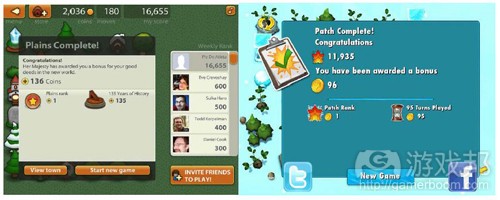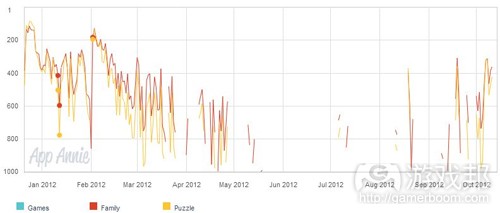复制游戏在App Store究竟能否获得成功?
作者:James Nouch
上周,Spry Fox与6waves的官司正式宣告结束。
该诉讼案是围绕着6waves的《Teti Town》是否抄袭Spry Fox的游戏《Triple Town》而展开。
在6waves的弃案要求被驳回后,该公司已经不再幻想能够赢得陪审团的支持,并希望能够与Spry Fox进行庭外和解。
法庭最终将《Yeti Town》的IP判给了Spry Fox,并终止了该款游戏的销售。这场官司带给世人一大疑问,即App Store上的复制游戏到底能否获得成功?
比较
根据分析(以《Triple Town》为例),比起复制游戏,消费者通常都会选择原创游戏。
尽管在市场营销方面《Yeti Town》更胜一筹,但是在美国最畅销游戏排行榜上它的最好成绩却只是第924位。
(以上是由App Annie所提供《Yeti Town》在美国最畅销游戏排行榜单上的表现的分析图表)。我们可以注意到图中并不存在一条有关畅销游戏排行榜位置的线——因为它在该榜单上的排名并不高。
与此相反的是该款游戏在某些亚洲地区取得了较大的成功,就像在澳门排行榜单上它便获得了第4名的好成绩——但是这一成绩仅维持了一天,之后便出现急剧下滑,所以从总体来看这款游戏并不能获得长久的成功。
而与之相比的是,《Triple Town》虽然未能打破销售记录,但是它的表现却远远优于其复制者。在美国的畅销游戏排行榜上它的最好成绩是第82位。
尽管这并不是个多好的成绩,但是关键在于,与只是短暂停留于畅销游戏排行榜的复制者相比,《Triple Town》从发行后便一直保留在前800名畅销游戏排行榜单之内。
利润缩水
但是还有许多游戏都未能如此完胜它们的“复制者”。
于2011年6月发行的《迷你大楼》(NimbleBit)在发行后便获得了大量的赞赏。该款游戏在美国畅销游戏排行榜上曾获得第3位的最好成绩,并且出现在32个地区的iTunes首页上,甚至还被苹果评为2011年度最佳游戏。
而Zynga的《Dream Heights》发行于2012年2月,并因为与《迷你大楼》的极高相似度而遭到了广泛的批评。
NimbleBit公开指责了Zynga缺乏想象力,并且Zynga的这款游戏在初次亮相于App Store时便遭遇了1颗星的惨淡评价。
可以说种种复制原因将Zynga置于了一个创造性和道德败坏的角色(游戏邦注:而NimbleBit则扮演着大胆的英雄),但是最终这款游戏却在美国最畅销游戏排行榜上获得了第12名的好成绩。
除此之外,在发行后三个月时间里《Dream Heights》一直保留在畅销游戏100名榜单内,紧接着的游戏更新也暗示了开发者想要朝着更好的成绩迈进的决心。
这并不是说《Dream Heights》超越了《迷你大楼》,从总体来看NimbleBit凭借《迷你大楼》所获得的收益还是远远超过其复制者。但是不可否认的是,尽管出现了许多负面新闻,但是Zynga所推出的这款游戏仍然赚取着大量的IAP收益。
最好与最遭
我们总是很难去分析其它更过分的复制品。
例如《神庙逃亡》便吸引了许多复制者的注意,但是这些复制者多属于通过迷惑用户而赚取利益的应用。即它们带有近乎相同的名字和图标,并突然出现以骗取那些粗心用户的钱财,但是最终都会被App Store逮住。
还有另外一些复制游戏则是汲取现有游戏的灵感,而不是直接去复制它们。
例如许多人都认为Angry Mob Games的《松饼骑士》模仿了Valmbeer的《超级包装箱》的游戏玩法,但是开发者却改变了游戏准则并添加了他们自己的主题和视觉设计。
《松饼骑士》是唯一比原创游戏获得更多苹果推荐的复制游戏。这款游戏也在223个地区的iTunes上得到的推荐(虽然不是出现在主页上)——与之相比的是《超级包装箱》只在91个地区的iTunes上得到推荐。
从畅销排行榜单来看,《超级包装箱》的排名虽然更高(在美国的排行榜中名列第107位),但是因为频繁的更新活动,《松饼骑士》更长时间地停留在畅销应用排行榜单的前1000名之内。
(以上是由App Annie所提供《松饼骑士》在美国最畅销游戏排行榜单上的表现的分析图表)。我们可以发现与《超级包装箱》(在发行一个月后便掉出1000名的排行)相比,这款游戏在排行榜单上坚持了更长时间。
我们很难明确说出哪一款游戏更加成功,但是很明显的是《松饼骑士》比起之前提到的任何一款复制游戏都更成功。
通过借鉴玩法系统而非游戏,Angry Mob Games避免了遭遇Zynga和6waves所承受的负面新闻,并获得了与其复制对象极为接近(可能还超越了)的收益。
总之,如果你正致力于创造一款复制游戏,你就需要为此投入一定的努力。因为聪明的玩家总是能够做出最公正的判断。
(本文为游戏邦/gamerboom.com编译,拒绝任何不保留版权的转载,如需转载请联系:游戏邦)
The Charticle: Just how successful are clones on the App Store anyway?
by James Nouch
Last week, Spry Fox’s legal battle with 6waves came to a close.
The case centred around the question of whether 6waves had infringed Spry Fox’s copyright by releasing a supposed Triple Town clone – Yeti Town – following early access to Spry Fox’s title when it was seeking out a publisher.
After 6waves’ motion to dismiss the case was denied, the company didn’t fancy its chances in front of a jury, and offered Spry Fox an out of court settlement.
As a consequence of this settlement, the Yeti Town IP has been handed to Spry Fox, and the game has been removed from sale. The whole affair begs a question, though: just how successful are clones on the App Store anyway?
Triple trouble
Not very, according to a quick glance at the analytics, which suggest – in the case of Triple Town, at least – consumers consistently preferred the original title to its clone.
Even though Yeti Town beat Triple Town to market on iOS, it only managed to peak at #924 in the US top grossing games chart.
Analytics graph (courtesy of App Annie) showing Yeti Town’s performance in the US top grossing charts. Note that there is no on-screen line for its grossing games chart position – it didn’t rank high enough.
The game found more success in certain Asian regions, most notably reaching #4 in Macau for one day before plummeting out of the charts, but overall, it failed to achieve sustained grossing success.
Triple Town, meanwhile, may not have broken sales records, but it performed significantly better than its imitator. In the US, it peaked at #82 in the top grossing games chart.
That may not be a hugely impressive ranking in itself, but the key point is that, while its clone enjoyed just a brief flirtation with the grossing games chart, Triple Town has been a permanent resident in the top 800 grossing games chart since launch.
Shrinking margins
Other titles haven’t managed to outperform their ‘clones’ quite so comprehensively, however.
NimbleBit’s Tiny Tower launched in June 2011, and attracted a steady stream of critical praise in the wake of its release. The title peaked at #3 in the US top grossing games chart, was featured on the iTunes home page in 32 regions and was named by Apple as its Game of the Year for 2011.
Zynga’s Dream Heights launched in February 2012, and attracted widespread criticism for its striking similarity to Tiny Tower.
NimbleBit publicly mocked Zynga for its lack of imagination, and its App Store debut was greeted with scores of one-star reviews.
But even though Dream Heights was now the unwitting lead in a narrative that cast Zynga as a creatively and morally bankrupt Goliath – and NimbleBit as a plucky David – the title performed well, peaking at #12 in the US top grossing games chart.
What’s more, Dream Heights remained in the top 100 grossing games chart for some three months after release, and title updates still see the game poke its head back into this upper echelon.
That’s not to say that Dream Heights has outperformed Tiny Tower, and overall, it would seem that NimbleBit’s original has monetised more strongly than its corporate rival. It’s notable, however, that Zynga’s offering still raked in plenty from in-app purchases in spite of all the bad press.
The best and worst
The success of other, more egregious clones is difficult to analyse, however.
Temple Run, for instance, has attracted dozens of imitations, but they tend to be premium apps designed to confuse customers. With near-identical names and app icons, these games pop up, earn as much as they can from the less-savvy consumers, and then are stamped out by the App Store enforcers.
At the other end of the spectrum are games that some believe take their inspiration from previous titles, without cloning them directly.
Angry Mob Games’ Muffin Knight, for example, is believed by many to reproduce the gameplay of Valmbeer’s Super Crate Box, but the developer has tweaked the formula and implemented its own thematic and visual design.
And, interestingly, it’s the only example here of an apparent clone that has received more featured slots from Apple than the original. Muffin Knight was featured in iTunes (although not on the home page) in 223 regions. Super Crate Box received similar spots in just 91 places.
In terms of grossing rank, Super Crate Box peaked higher (reaching #107 in the US), but regular title updates kept Muffin Knight in the top 1000 grossing games chart for considerably longer.
Analytics graph (courtesy of App Annie) showing Muffin Knight’s performance in the Us top grossing games chart. Note the long tail compared to Super Crate Box, which dropped out of the top 1000 after one month.
It’s difficult to say which game was more successful, then, but it’s clear that Muffin Knight is better regarded than many of the other supposed imitators mentioned here.
By supposedly mirroring a gameplay system rather than a game, Angry Mob Games avoided the bad press that Zynga and 6waves generated, and came closest to matching (or possibly exceeding) the revenue generated by its inspiration.
In other words, we’d suggest that, if you’re considering cloning a game, you’d best put some effort into it. Players can tell the difference. (source:pocketgamer.biz)










































 闽公网安备35020302001549号
闽公网安备35020302001549号